Annual Applied Complexity Network and Board of Trustees Symposium: The Emerging Frontiers of Invention Speakers: Difference between revisions
From Santa Fe Institute Events Wiki
No edit summary |
No edit summary |
||
| Line 55: | Line 55: | ||
Alan has published articles on technology and social impact in Scientific American, Education Week, Huffington Post, Slate, Politico, Marketwatch and Knowledge Quest. Most recently He is co-author, with his two brothers, of Designing Reality: How to Survive and Thrive in the 3rd Digital Revolution. Alan serves on the Board of Directors of FilmAid International and on the Advisory Boards of iCivics and the Joan Ganz Cooney Center For Educational Media and Research (Sesame Workshop). He is also former Chairman of the Board for Games for Change. | Alan has published articles on technology and social impact in Scientific American, Education Week, Huffington Post, Slate, Politico, Marketwatch and Knowledge Quest. Most recently He is co-author, with his two brothers, of Designing Reality: How to Survive and Thrive in the 3rd Digital Revolution. Alan serves on the Board of Directors of FilmAid International and on the Advisory Boards of iCivics and the Joan Ganz Cooney Center For Educational Media and Research (Sesame Workshop). He is also former Chairman of the Board for Games for Change. | ||
<div style="clear: both;"></div> | |||
<hr /> | |||
[[File:Bill.Gurley.jpg|thumb|200px|[https://www.santafe.edu/people/profile/bill-gurley '''Bill Gurley''']<br />'''Benchmark & SFI''']] | |||
'''Bill Gurley''' has spent 18 years as a General Partner at Benchmark, joining in 1999, and is a member of the Board of Trustees at the Santa Fe Institute. Over his venture career, he has invested in and served on the board of such companies as Jamdat (IPO: JMDT, Acq. by EA), GrubHub (IPO: GRUB), Nextdoor, OpenTable (IPO: OPEN, Acq.by Priceline), Stitch Fix, Uber, and Zillow.com (IPO: Z). Before entering the venture capital business, Bill spent four years on Wall Street as an “Institutional Investor” ranked research analyst, including three years at CS First Boston. He also worked as the lead analyst on Amazon's IPO. Prior to his finance career, he worked as a computer engineer at Compaq in Houston. Bill received his BS in computer science from the University of Florida, and an MBA from the University of Texas. He is also a Chartered Financial Analyst. He and his wife are active supporters of the Opportunity Fund and KIPP Bay Area. Bill also maintains a blog on the evolution and economics of high technology businesses called Above the Crowd, and can be followed on Twitter at @bgurley. | |||
<div style="clear: both;"></div> | <div style="clear: both;"></div> | ||
<hr /> | <hr /> | ||
| Line 81: | Line 87: | ||
<hr /> | <hr /> | ||
[[File:juanMG.png|thumb|200px|[https://www.nesta.org.uk/team/juan-mateos-garcia/ '''Juan Mateos-Garcia''']<br />'''Nesta''']] | |||
'''Juan Mateos-Garcia''' is currently the Director of Innovation Mapping at Nesta. Juan leads a team of data scientists, developers, visualisers and innovation experts who use new datasets, analytics methods and visualisation tools to inform innovation policy. He is currently working on EURITO, a 3-year project to develop new innovation indicators for the EU, and a Health Innovation Mapping project with the Robert Woods Johnson Foundation in the US. Before this, he led Arloesiadur, a project to map innovation in Wales, and several high-impact projects about the geography of the creative industries in the UK (most recently, Creative Nation). | |||
Prior to joining Nesta, Juan worked as a researcher at SPRU (Science Policy Research Unit) at the University of Sussex, and CENTRIM at the University of Brighton. Juan has a degree in Economics (with distinction) for Universidad de Salamanca (Spain), and an MSc (with distinction) in Science and Technology Policy from SPRU, University of Sussex. | |||
<div style="clear: both;"></div> | |||
<hr /> | |||
[[File:ConstanceSteinkuehler.jpg|thumb|200px|[https://www.informatics.uci.edu/explore/faculty-profiles/contance-steinkuehler/ '''Constance Steinkuehler''']<br />'''UC Irvine''']] | [[File:ConstanceSteinkuehler.jpg|thumb|200px|[https://www.informatics.uci.edu/explore/faculty-profiles/contance-steinkuehler/ '''Constance Steinkuehler''']<br />'''UC Irvine''']] | ||
Revision as of 19:00, 15 October 2018
November 9-10, 2018
Santa Fe Institute
Panelists & Moderators Include:
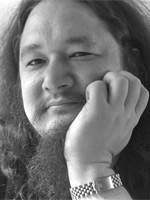
UNM
Dave Ackley is currently an emeritus associate professor of Computer Science at the University of New Mexico, and was previously an External Faculty member at the Santa Fe Institute. Dr. Ackley explores living computation – the principle that living systems and computational systems are ultimately the same things. His research has contributed to neural networks and machine learning, evolutionary algorithms and artificial life, and biological approaches to security, architecture, and models of computation. He is developing robust-first computing on indefinitely scalable computer architectures, moving beyond deterministic execution to expand computational power and achieve a credible basis for computer security.
Dr. Ackley earned his BS in Applied Mathematics from Tufts University, and his MS and PhD in Computer Science from Carnegie Mellon University.
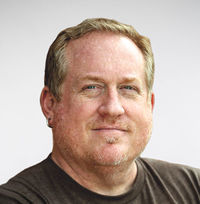
Pacific Light & Hologram
Seamus Blackley, widely known as the “father of the Xbox,” is a high energy physicist and game designer who is currently CEO of venture-backed startup Pacific Light & Hologram.

Infinity Light Science
Tristan Duke is an artist with a background in photography and holography. With a deep interest in the science of optics and visual perception, Tristan seeks to invent new forms of visual representation. His work has been exhibited internationally including: Art Villa Garikula, Georgia; The Velaslavasay Panorama, Los Angeles; MASS MoCA, North Adams; and Holocenter, Long Island, NY. Since 2008 he has been pioneering the development of hand-drawn holography as a creative medium. In 2014, he invented a new holographic technology to create the first ever hand-drawn holographic record for Jack White’s album Lazaretto. He has gone on to create hologram artwork for many records including the Star Wars: The Force Awakens sound track (2016). He is a founding member (along with Lauren Bon and Richard Nielsen) of the Optics Division of the Metabolic Studio. With the Optics Division, exhibitions include: DePaul Art Museum, Chicago, IL; Los Angeles Contemporary Exhibitions (LACE); the Hammer Museum, Los Angeles; Les Rencontres d'Arles, France; The George Eastman House, Rochester, NY; and the Smithsonian Hirshhorn, Washington DC.
Tristan moved his studio, Infinity Light Science, to Los Angeles in 2010. He is a fellow at the Museum of Jurassic Technology.
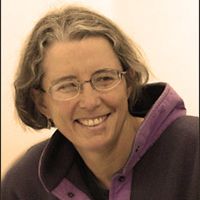
ASU & SFI
Stephanie Forrest works at Arizona State University, where she directs the Biodesign Center for Biocomputation, Security and Society, and she is a Professor in the School of Computing, Informatics and Decision Sciences Engineering CIDSE). Prior to joining ASU, she was Regents Distinguished Professor of Computer Science at the University of New Mexico in Albuquerque and served as Dept. Chair 2006-2007. Professor Forrest was educated at St. John's College (B.A.), and The University of Michigan (M.S. and Ph.D. in Computer Science). She is currently a member of the External Faculty at the Santa Fe Institute, and served as Co-chair of its Science Board (2010-2013) and as Interim Vice President (1999-2000). She spent 2013-2014 as a Jefferson Science Fellow at the U.S. Dept. of State and is currently a board member of the Computing Research Association.
Forrest's research studies the biology of computation and the computation of biology, including work on computational immunology, computer security, automated software repair, evolutionary computation, and biological modeling. Some of her awards include: the SFI Stanislaw Ulam Memorial Lectures (2013), the UNM Annual Research Lecture (2012), the ACM/AAAI Allen Newell Award (2011), and the Presidential Young Investigator Award (1991). She is a Fellow of the IEEE.
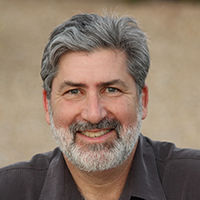
E-Line Media
Alan Gershenfeld is Co-Founder/President of E-Line Media, a developer of games that help players understand and shape the world. Alan has worked on impact game projects with the Gates Foundation, MacArthur Foundation, NSF, USAID, DARPA, White House OSTP, Cook Inlet Tribal Council, Games for Change, Google, Sesame Workshop, MIT Center for Bits and Atoms and ASU Center for Games and Impact.
Prior to E-Line, Alan was member of the executive management team that rebuilt game publisher Activision from bankruptcy into a global industry leader. As SVP of Activision Studios, Alan oversaw titles such as Civilization: Call to Power, Asteroids 3D, Muppet Treasure Island, Spycraft, Pitfall, Zork and Tony Hawk Skateboarding.
Alan has published articles on technology and social impact in Scientific American, Education Week, Huffington Post, Slate, Politico, Marketwatch and Knowledge Quest. Most recently He is co-author, with his two brothers, of Designing Reality: How to Survive and Thrive in the 3rd Digital Revolution. Alan serves on the Board of Directors of FilmAid International and on the Advisory Boards of iCivics and the Joan Ganz Cooney Center For Educational Media and Research (Sesame Workshop). He is also former Chairman of the Board for Games for Change.

Benchmark & SFI
Bill Gurley has spent 18 years as a General Partner at Benchmark, joining in 1999, and is a member of the Board of Trustees at the Santa Fe Institute. Over his venture career, he has invested in and served on the board of such companies as Jamdat (IPO: JMDT, Acq. by EA), GrubHub (IPO: GRUB), Nextdoor, OpenTable (IPO: OPEN, Acq.by Priceline), Stitch Fix, Uber, and Zillow.com (IPO: Z). Before entering the venture capital business, Bill spent four years on Wall Street as an “Institutional Investor” ranked research analyst, including three years at CS First Boston. He also worked as the lead analyst on Amazon's IPO. Prior to his finance career, he worked as a computer engineer at Compaq in Houston. Bill received his BS in computer science from the University of Florida, and an MBA from the University of Texas. He is also a Chartered Financial Analyst. He and his wife are active supporters of the Opportunity Fund and KIPP Bay Area. Bill also maintains a blog on the evolution and economics of high technology businesses called Above the Crowd, and can be followed on Twitter at @bgurley.

Sproutel
Aaron Horowitz is the co-founder and CEO of Sproutel, which is a patient-centered R&D workshop focused on creating technology at the intersection of patient and market needs. Previous to Sproutel, Aaron was a National Board Advisor at Design for America. Aaron received a BS in Mechanical Engineering from Rice University, and a BS in Mechatronics and User Interaction Design from Northwestern University.

Viewpoints Research Institute & UCLA
Alan Kay was born in Springfield, Massachusetts, in 1940. He received a B.S. in mathematics and molecular biology from the University of Colorado at Boulder (1966) and an M.S. (1968) and Ph.D. (1969) from the University of Utah in Computer Science.
Kay is best known for the idea of personal computing, the concept of the laptop computer, and the inventions of the now ubiquitous overlapping-window interface and modern object-oriented programming.
His deep interest in children was the catalyst for these ideas, and it continues to inspire him. Kay was one of the founders of the Xerox Palo Alto Research Center (PARC), in Palo Alto, California, where he led one of the groups that developed ideas into modern workstations (and the forerunner of the Macintosh), the Smalltalk computer language, the overlapping-window interface, desktop publishing, the Ethernet, laser printing, and network "client servers." His "Dynabook" concept prefigured the modern laptop computer by several decades.
Kay has received many awards, including ACM's Software Systems Award and the J-D Warnier Prix d'Informatique. He is a Fellow of the American Academy of Arts and Sciences, the National Academy of Engineering, and the Royal Society of Arts. He has won the ACM Turing Award (2003) and the Kyoto Prize (2004).
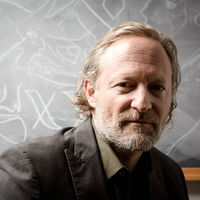
Santa Fe Institute
David Krakauer's research explores the evolution of intelligence on earth. This includes studying the evolution of genetic, neural, linguistic, social and cultural mechanisms supporting memory and information processing, and exploring their shared properties. He served as the founding Director of the Wisconsin Institute for Discovery, the Co-Director of the Center for Complexity and Collective Computation, and Professor of mathematical genetics all at the University of Wisconsin, Madison. David has been a visiting fellow at the Genomics Frontiers Institute at the University of Pennsylvania, a Sage Fellow at the Sage Center for the Study of the Mind at the University of Santa Barbara, a long-term Fellow of the Institute for Advanced Study in Princeton, and visiting Professor of Evolution at Princeton University. In 2012 Dr. Krakauer was included in the Wired Magazine Smart List as one of 50 people "who will change the World.” In 2016 Krakauer was included in Entrepreneur Magazine’s visionary Leaders advancing global research and business.
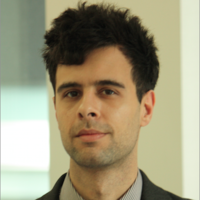
Nesta
Juan Mateos-Garcia is currently the Director of Innovation Mapping at Nesta. Juan leads a team of data scientists, developers, visualisers and innovation experts who use new datasets, analytics methods and visualisation tools to inform innovation policy. He is currently working on EURITO, a 3-year project to develop new innovation indicators for the EU, and a Health Innovation Mapping project with the Robert Woods Johnson Foundation in the US. Before this, he led Arloesiadur, a project to map innovation in Wales, and several high-impact projects about the geography of the creative industries in the UK (most recently, Creative Nation).
Prior to joining Nesta, Juan worked as a researcher at SPRU (Science Policy Research Unit) at the University of Sussex, and CENTRIM at the University of Brighton. Juan has a degree in Economics (with distinction) for Universidad de Salamanca (Spain), and an MSc (with distinction) in Science and Technology Policy from SPRU, University of Sussex.

UC Irvine
Constance Steinkuehler is a Professor of Informatics at the University of California, Irvine where she researches the cognitive and social aspects of esports and multiplayer online videogames. Constance currently chairs the Annual Esports Conference at UCI and the UCI Esports Program Task Force for Diversity and Inclusion. She is the founder and former President of the Higher Education Video Games Alliance and formerly served as Senior Policy Analyst, advising on games and digital media, under the Obama administration in the White House Office of Science and Technology Policy.
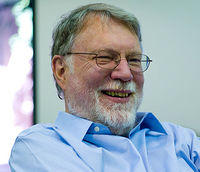
Deloitte Center for the Edge & USC
John Seely Brown or as he is often called—JSB—is the Independent Co-Chairman of the Deloitte’s Center for the Edge and a visiting scholar and advisor to the Provost at University of Southern California (USC). A master integrator and instigator of productive friction, JSB explores the whitespace between disciplines and builds bridges between disparate organizations and ideas.
Prior to that he was the Chief Scientist of Xerox Corporation and the director of its Palo Alto Research Center (PARC)—a position he held until June 2000. In his more than two decades at PARC, Brown transformed the organization into a truly multidisciplinary research center at the creative edge of applied technology and design, integrating social sciences and arts into the traditional physics and computer science research and expanding the role of corporate research to include topics such as the management of radical innovation, organizational learning, complex adaptive systems, and nano-technologies. He was a cofounder of the Institute for Research on Learning (IRL). His personal research interests include digital youth culture, digital media, and the application of technology to fundamentally rethink the nature of work and institutional architectures in order to enable deep learning across organizational boundaries – in brief, to design for emergence in a constantly changing world. JSB is a member of the American Academy of Arts and Sciences, the National Academy of Education, a Fellow of the American Association for Artificial Intelligence and of AAAS and a Trustee of the MacArthur Foundation. He serves on numerous private and public boards of directors, including Amazon, and has been a trustee for nonprofits including the MacArthur Foundation and In-Q-tel. In addition to publishing over 100 papers in scientific journals, JSB has authored numerous articles and reports spanning business strategy and management issues. He was awarded the Harvard Business Review's 1991 McKinsey Award for his article "Research that Reinvents the Corporation" and again in 2002 for his article (with John Hagel) "Your Next IT Strategy." In 1997 he edited the book Seeing Differently: Insights on Innovation (Harvard Business Review Books, 1997) about how new organizational structures, technologies, and global perspectives could change the way innovation occurs. He co-authored (with Paul Duguid) the acclaimed book The Social Life of Information (HBS Press, 2000), which has been translated into 10 languages with a second edition in April 2002. With John Hagel, he co-authored the books The Only Sustainable Edge about new forms of collaborative innovation and The Power of Pull: how small moves, smartly made can set big things in motion, published April 2010. His most recently published book, The New Culture of Learning, co-authored with Doug Thomas at the University of Southern California, was released January 2011. He is currently working on a new book, co-authored with Ann Pendleton-Jullian at Georgetown University called Design Unbound.
JSB received a BA from Brown University in 1962 in mathematics and physics and a PhD from the University of Michigan in 1970 in computer and communication sciences. His eight honorary degrees reflect the breadth and diversity of his leadership, including: May 2000, Brown University, Doctor of Science Degree; July 2001, London Business School, Honorary Doctor of Science in Economics; May 2004, Claremont Graduate University, Honorary Doctor of Humane Letters; May 2005, University of Michigan, Honorary Doctor of Science Degree; May 2009, North Carolina State University, Honorary Doctor of Science Degree; May 2011, Illinois Institute of Technology, Honorary Doctor of Design; July 2013 Singapore Management University, Doctor of Information Systems; May 2014, Bates College, Honorary Doctor of Science; May 2015, Arizona State University, Honorary Doctor of Human Letters. He is an avid reader, traveler and motorcyclist. Part scientist, part artist and part strategist, JSB's views are unique and distinguished by a broad view of the human contexts in which technologies operate and a healthy skepticism about whether or not change always represents genuine progress.

The Baffler
Jacob Silverman is a freelance journalist and occasional book critic. He’s the author of Terms of Service: Social Media and the Price of Constant Connection, published in 2015 by HarperCollins. His work has appeared in the Los Angeles Times, New York Times, The New Republic, The Washington Post, Slate, and many other publications. He’s a contributing editor for The Baffler and often writes about the politics of tech, privacy, surveillance, and media.
In April 2012, Jacob was a three-time Jeopardy champion, an ultimately meaningless distinction (the money’s long spent) that he’s still using to ease his way through uncomfortable parties and tepid personal bios. He lives in New York. He has two cats, an unpublished novel, and a well-honed sense of grievance. His website is www.jacobsilverman.com. He tweets reluctantly, and poorly, as @silvermanjacob.

Inevitable Ventures
D.A. Wallach is best known as a recording artist and songwriter who Kanye West and Pharrell Williams discovered while he was an undergraduate at Harvard College. He has been featured in GQ, Rolling Stone, Vogue, and numerous other publications, and has performed on TV Shows including Jimmy Kimmel Live and Late Night with Jimmy Fallon. His solo debut for Capitol Records, Time Machine, is available at www.TimeMachineAlbum.com
As an investor, D.A. has backed groundbreaking technology businesses, including Spotify, Doctor On Demand, SpaceX, Ripple, and DAQRI. Forbes selected D.A. as one of its 30 Under 30 and Fast Company named him one of the 100 Most Creative People in Business. As one of facebook's first users and one of the most followed artists on twitter (@dawallach), he is a recognized social media pioneer, and frequently publishes essays on media, technology, and philosophy at www.medium.com/@dawallach.
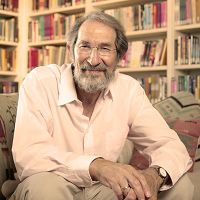
Santa Fe Institute
Geoffrey West is a theoretical physicist whose primary interests have been in fundamental questions in physics, especially those concerning the elementary particles, their interactions and cosmological implications. West served as SFI President from July 2005 through July 2009. Prior to joining the Santa Fe Institute as a Distinguished Professor in 2003, he was the leader, and founder, of the high energy physics group at Los Alamos National Laboratory, where he is one of only approximately ten Senior Fellows.
His long-term fascination in general scaling phenomena evolved into a highly productive collaboration on the origin of universal scaling laws that pervade biology from the molecular genomic scale up through mitochondria and cells to whole organisms and ecosystems. This led to the development of realistic quantitative models for the structural and functional design of organisms based on underlying universal principles. This work, begun at the Institute, has received much attention in both the scientific and popular press, and provides a framework for quantitative understanding of problems ranging from fundamental issues in biology (such as cell size, growth, metabolic rate, DNA nucleotide substitution rates, and the structure and dynamics of ecosystems) to questions at the forefront of medical research (such as aging, sleep, and cancer). Among his current interests is the extension of these ideas to understand quantitatively the structure and dynamics of social organizations, such as cities and corporations, including the relationships between economies of scale, growth, innovation and wealth creation and their implications for long-term survivability and sustainability.
He is a Fellow of the American Physical Society and was one of their Centenary Speakers in 2003. He has been a lecturer in many popular and distinguished scientist series worldwide, as well as at the World Economic Forum. Among recent honors he was a co-receiver of the Mercer Award from the Ecological Society of America, the Weldon Memorial Prize (2005), Oxford University and the Glenn Award for research on Aging and the APS Szilard Award (2013). In 2006 he was named one of Time magazine's "100 Most Influential People in the World" and his work selected as one of the breakthrough ideas of 2007 by the Harvard Business Review. He is the author of several books, a visiting Professor of Mathematics at Imperial College, London, and an associate fellow of the Said Business School at Oxford University.
West received his BA from Cambridge University in 1961 and his doctorate from Stanford University in 1966, where he returned in 1970 to become a member of the faculty. West is married to Jacqueline West, a psychologist in private practice; they have two children: Joshua, is an Assistant Professor in the Department of Earth Sciences at the University of Southern California and an Olympic silver-medalist. Devorah, is studying International Studies at Stanford.
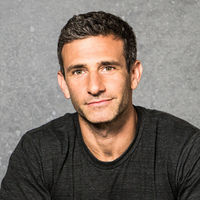
Lux Capital & Santa Fe Institute
Josh Wolfe is a co-founder and managing partner at Lux Capital, and a member of the Board of Trustees with the Santa Fe Institute. In his role at Lux Capital, Josh works to support scientists and entrepreneurs who pursue counter-conventional solutions to the most vexing puzzles of our time in order to lead us into a brighter future. The more ambitious the project, the better—like, say, creating matter from light.
Josh is a Director at Shapeways, 3Scan, Lux Research, Kallyope, and CTRL-labs and helped lead the firm’s investments in Planet, Echodyne, Clarifai and Authorea. He is a founding investor and board member with Bill Gates in Kymeta, making cutting-edge antennas for high-speed global satellite and space communications. Josh is a Westinghouse semi-finalist and published scientist. He previously worked in investment banking at Salomon Smith Barney and in capital markets at Merrill Lynch. In 2008 Josh co-founded and funded Kurion, a contrarian bet in the unlikely business of using advanced robotics and state-of-the-art engineering and chemistry to clean up nuclear waste. It was an unmet, inevitable need with no solution in sight. The company was among the first responders to the Fukushima Daiichi disaster. In February 2016, Veolia acquired Kurion for nearly $400 million—more than 40 times Lux’s total investment.
Josh is a columnist with Forbes and Editor for the Forbes/Wolfe Emerging Tech Report. He has been invited to The White House and Capitol Hill to advise on nanotechnology and emerging technologies, and a lecturer at MIT, Harvard, Yale, Cornell, Columbia and NYU. He is a term member at The Council on Foreign Relations and Chairman of Coney Island Prep charter school, where he grew up in Brooklyn. He graduated from Cornell University with a B.S. in Economics and Finance.
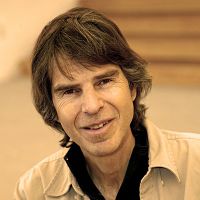
Santa Fe Institute
David Wolpert is an IEEE fellow, is the author of three books and more than 200 papers, has three patents, is an associate editor at more than half a dozen journals, and has received numerous awards. He has more than 17,000 citations in a wide range of fields, including physics, machine learning, game theory, information theory, the therodynamics of computation, and distributed optimization. In particular, his machine learning technique of stacking was instrumental in both winning entries for the Netflix competiton, and his papers on the no free lunch theorems jointly have more than 7,000 citations.
He is a world expert on using nonequilibrium statistical physics to analyze the thermodynamics of computing systems; extending game theory to model humans operating in complex engineered systems; exploiting machine learning to improve optimization; and Monte Carlo methods.
He is currently a member of the resident faculty at the Santa Fe Institute. Previously he was the Ulam Scholar at the Center for Nonlinear Studies at Los Alamos National Laboratory, and before that he was at the NASA Ames Research Center and was a consulting professor at Stanford University, where he formed the Collective Intelligence Group. He has worked at IBM and at a data mining startup, and he is external faculty at numerous international institutions. His degrees in physics are from Princeton University and the University of California.

